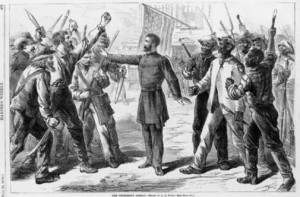Today’s post will be a bit of a short one—my apologies in advance for that. Preparations for the 2014 Society of US Intellectuals Conference, along with a growing list of items that need to be checked off for my personal graduate school experience, have robbed me of some of the time I’d otherwise devote to researching this post. Of course, that’s something we’re all experiencing these days, so it is not meant as a complaint. In fact, it’s an opportunity, as it offers me a chance to direct you to some interesting books and blogs about the topic of Reconstruction and intellectual history.
Christopher Bonner’s post over at the African American Intellectual History Society blog on 1865 and the first, post-emancipation African American political meetings speaks to what I’ve been writing about on the blog the last few weeks. What is particularly interesting about Bonner’s post, and has been pointed out by at least one commenter on this blog, is that the immediate post-Civil War period in 1865 was fraught with both promise for African Americans, and considerable concern over what the future held for them. My posts, so far, have focused more on the memory of the period, but Bonner reminds us that there’s also much to be done on the intellectual history of Reconstruction.
Speaking of which, I’ve become increasingly interested in the international dimensions of Reconstruction. And this isn’t just in regards to how journalists and intellectuals outside the U.S. viewed the grand experiment from abroad—although that’s important too. A recent book release, The Age of Garvey by Adam Ewing, begins by situating pan-Africanism and the growth of black politics in the 1860s—with African Americans becoming empowered in the American South, while Jamaica experienced severe racial and political tensions and West Africa seeing the growth of a potential African intelligentsia. Of course, we all know that by 1900, any attempts at racial egalitarianism were seen as the highest of folly in Western Europe and the United States. Nonetheless, the short comparative history Ewing offers here (and I wouldn’t be surprised if something like this has been done elsewhere) is stunning, because it makes plenty of sense to do.
New works on the Reconstruction—such as Ordeal of the Reunion—have also peaked my interest. As I’ve argued before, the Reconstruction era offers a glimpse into the rise of the modern United States. The Second American Revolution has become the bedrock for many, if not all, the major political and intellectual battles in American history since 1865. The fact that we’re still drawing so much out of the period is a testament to its hold on both historians and the lay public. And digging through Reconstructions, of course, has me considering even more questions about the era.
I’m currently moving further and further into dissertation mode. This means that I’ll be living in, and paying rent so to speak, in the 1970s and 1980s American South. But I’ll take the occasional walk through the Reconstruction era, not just because it fascinates me but because thinking about the period as a historian is essential to understanding the “Second Reconstruction” of the 1960s, as C. Vann Woodward has called it.
Meanwhile, I’m curious—what’s your favorite book or article on the Reconstruction period, and why? Mine is, not surprisingly, Black Reconstruction by W.E.B. Du Bois. I ask not just to create a reading list (ahem), but to gauge what interests people about the era. And please, don’t let the list be limited to the South—consider the Gilded Age and the West as well.

3 Thoughts on this Post
S-USIH Comment Policy
We ask that those who participate in the discussions generated in the Comments section do so with the same decorum as they would in any other academic setting or context. Since the USIH bloggers write under our real names, we would prefer that our commenters also identify themselves by their real name. As our primary goal is to stimulate and engage in fruitful and productive discussion, ad hominem attacks (personal or professional), unnecessary insults, and/or mean-spiritedness have no place in the USIH Blog’s Comments section. Therefore, we reserve the right to remove any comments that contain any of the above and/or are not intended to further the discussion of the topic of the post. We welcome suggestions for corrections to any of our posts. As the official blog of the Society of US Intellectual History, we hope to foster a diverse community of scholars and readers who engage with one another in discussions of US intellectual history, broadly understood.
Favorite book? Tempted to say Foner’s RECONSTRUCTION (but also his excellent NOTHING BUT FREEDOM) but really it’s gotta be Heather Cox Richardson’s ‘Death of Reconstruction.’ That’s the one I can’t get out of my mind.
A great question, Robert! Other than Du Bois, I really like David Montgomery’s Beyond Equality, Steven Hahn’s A Nation Under Our Feet, and Stephen Kantrowitz’s biography of Ben Tillman.
Some of my favorite books on the period (a bit of a depressing list, I suppose):
Lichtenstein, Alexander C. Twice the Work of Free Labor: The Political Economy of Convict Labor in the New South. London: Verso, 1996.
Nelson, Scott Reynolds. Iron Confederacies: Southern Railways, Klan Violence, and Reconstruction. Chapel Hill: University of North Carolina Press, 1999.
Cell, John Whitson. The Highest Stage of White Supremacy: The Origins of Segregation in South Africa and the American South. Cambridge [Cambridgeshire]: Cambridge University Press, 1982.
Woods, Clyde Adrian. Development Arrested: The Blues and Plantation Power in the Mississippi Delta. London: Verso, 1998.
(I also think C Vann Woodward Origins of the New South is very rewarding reading, with about 60000 grains of salt).